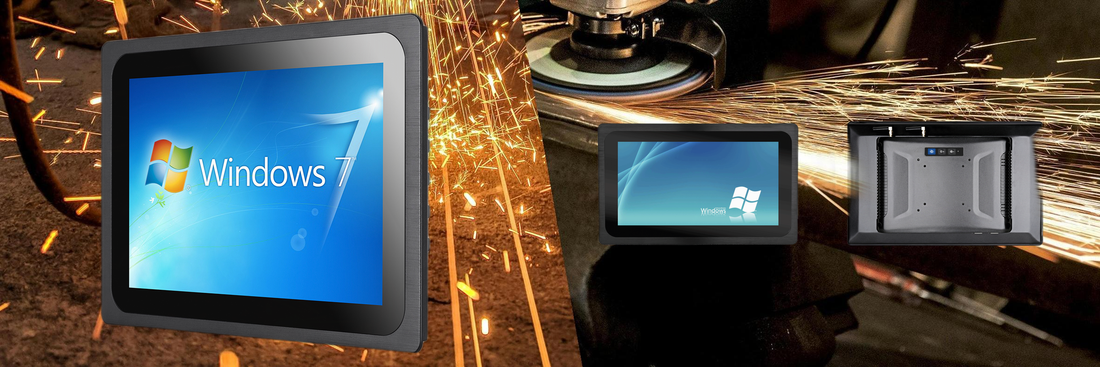
Advanced 4G, LTE, and 5G Industrial PCs: Powering Reliable Connectivity for Remote Operations
Advanced 4G, LTE, and 5G Industrial PCs: Powering Reliable Connectivity for Remote Operations
Industrial computers, especially those deployed in remote and harsh environments, face significant challenges in maintaining stable and reliable connectivity. In many such areas, traditional wired or wireless LAN connectivity is either unavailable or inconsistent. This is where 4G, LTE, and 5G industrial PCs come into play, offering a robust alternative through cellular connectivity, ensuring that critical operations can continue uninterrupted. As the demand for remote monitoring, edge computing, and IIoT (Industrial Internet of Things) grows, the importance of these industrial-grade computers becomes even more apparent.
What Are 4G, LTE, and 5G Industrial PCs?
4G, LTE, and 5G industrial PCs are specially designed, ruggedized computers equipped with onboard SIM sockets, electronically routed to Mini PCIe modules, providing cellular connectivity. This feature makes them invaluable for applications where consistent wired or wireless internet connections are not feasible. They offer enhanced versatility in remote deployments, from industrial automation to smart cities and vehicle-based systems.
The key to these systems' reliability lies in their dual SIM socket design, which allows them to maintain cellular connectivity even in the event of a carrier disruption. Should one cellular network fail or experience downtime, the PC can seamlessly switch to an alternative carrier, maintaining critical internet access.
Cellular Connectivity and IIoT
In industrial environments, continuous data flow is vital, especially for IIoT systems where devices are connected across various locations for monitoring and control purposes. 4G, LTE, and 5G-enabled industrial PCs excel in edge computing scenarios, offering reliable data offloading to the cloud for real-time analytics. Additionally, these systems ensure that even when Wi-Fi or wired connections are compromised, businesses can still rely on cellular networks to maintain connectivity, minimizing downtime and preventing potential losses.
The Evolution of Connectivity: From 4G LTE to 5G
4G LTE: The Foundation of High-Speed Cellular Networking
Before the introduction of 5G, 4G LTE (Long Term Evolution) was the fastest cellular standard. LTE offers impressive data transfer rates, with speeds reaching up to 2,000 Megabits per second (Mbps). This makes 4G LTE industrial PCs suitable for applications that require moderate to high-speed connectivity, such as in-vehicle computers or IoT gateways, where fast, dependable internet access is essential for mission-critical data transfer.
The widespread deployment of 4G LTE across various industries created a reliable foundation for remote computing, providing robust connectivity for data monitoring, predictive maintenance, and automation in sectors such as manufacturing, agriculture, and logistics.
5G: The Future of Ultra-Fast Connectivity
With the advent of 5G, industrial computing has taken another leap forward. 5G networks bring groundbreaking improvements in data transfer speeds, with theoretical rates of up to 10,000 Mbps (10 Gbps), more than five times faster than 4G LTE. But speed is not the only advantage—5G also dramatically reduces latency, making it ideal for real-time applications that require instantaneous data exchange and decision-making.
For industries that demand ultra-reliable low-latency communication (URLLC), such as autonomous vehicles, smart grids, and remote robotics, 5G-equipped industrial PCs are indispensable. The enhanced bandwidth and lower latency of 5G also support more complex IIoT architectures, enabling real-time data processing, analysis, and control over vast networks of connected devices.
Key Benefits of Cellular-Connected Industrial PCs
- Reliability and Redundancy: Industrial PCs equipped with dual SIM sockets ensure that operations continue without interruption by allowing seamless carrier switching. This redundancy is crucial for mission-critical applications where even minimal downtime can be costly.
- Remote Access and Troubleshooting: Cellular connectivity enables engineers and technicians to access devices remotely, regardless of physical location. This feature is invaluable in remote areas where sending personnel for on-site maintenance may be costly and time-consuming.
- Real-Time Data Offloading: In scenarios where continuous data flow is essential, cellular connectivity ensures that critical information can be transmitted to the cloud for analysis and decision-making, even in the absence of wired or Wi-Fi networks.
- Versatility Across Industries: From agriculture and smart cities to manufacturing and transport, industrial PCs with 4G, LTE, and 5G connectivity are used across a broad spectrum of industries, supporting IIoT, smart infrastructure, and remote monitoring solutions.
Ensuring Compatibility with Cellular Carriers
When selecting a cellular-enabled industrial PC, it's important to ensure compatibility with the carrier's network in your deployment area. Commonly supported carriers include AT&T, Verizon, and T-Mobile, with industrial PCs often allowing connections to multiple carriers through dual SIM cards. This flexibility is particularly beneficial in mobile applications, such as vehicle-based systems, where connectivity needs to be maintained across different regions with varying network availability.
How Do Industrial PCs Enable Cellular Connectivity?
Mini industrial PCs, known for their compact yet powerful design, provide cellular connectivity through Mini PCIe modules. These modules come equipped with integrated SIM card slots and are optimized for M2M (Machine-to-Machine) and IoT applications. They offer fast uplink and downlink speeds, ensuring reliable communication for remote and mobile applications.
These industrial PCs, fitted with certified cellular modules, eliminate the need for additional certification from cellular carriers, simplifying the deployment process. This plug-and-play design ensures that even the smallest industrial PCs can seamlessly integrate cellular connectivity, making them highly adaptable to various industrial environments.
Deployment Steps for Cellular Industrial PCs
- Selecting the Right System: Choose an industrial PC that supports cellular connectivity tailored to your specific use case.
- SIM Activation: After acquiring the necessary SIM cards from your chosen cellular carrier, insert the SIM into the designated socket in the PC and activate it through the carrier.
- Network Setup: Once activated, configure the industrial PC to connect to the network, enabling remote monitoring, data collection, or control applications.
Additional Connectivity Options for Industrial PCs
Apart from cellular connections, industrial PCs are typically outfitted with various additional connectivity options, including:
- Gigabit Ethernet (RJ45 or M12): Offering fast, reliable wired connectivity for high-throughput applications.
- Wi-Fi: Providing flexible wireless connectivity with high data rates and extensive range, suitable for many industrial scenarios.
- Bluetooth: Used for low-power, short-range device communication, Bluetooth is ideal for pairing peripherals or localized data transfer.
These multiple connectivity options ensure that industrial PCs can operate in diverse environments, adapting to both wired and wireless infrastructure as needed.
The Future of Industrial Connectivity
The rise of 5G represents a significant shift in industrial connectivity, enabling faster data transfer, lower latency, and the ability to handle an increasing number of connected devices. This shift opens the door for more advanced applications, such as AI-driven industrial automation, predictive maintenance powered by real-time data, and enhanced remote monitoring.
As cellular networks continue to evolve, industrial PCs equipped with 4G, LTE, and 5G capabilities will remain at the forefront of industrial automation and IIoT deployments, driving greater efficiency, productivity, and reliability across industries.
For businesses seeking to deploy cutting-edge industrial computing solutions with reliable connectivity, understanding the benefits and technological advancements in cellular-enabled industrial PCs is critical.
For more detailed information on choosing the best solution for your industrial computing needs, visit IMDTouch or contact our team at support@IMDTouch.com. Our experts are ready to assist you in selecting the right industrial PC that ensures seamless, high-speed connectivity for your mission-critical operations.
